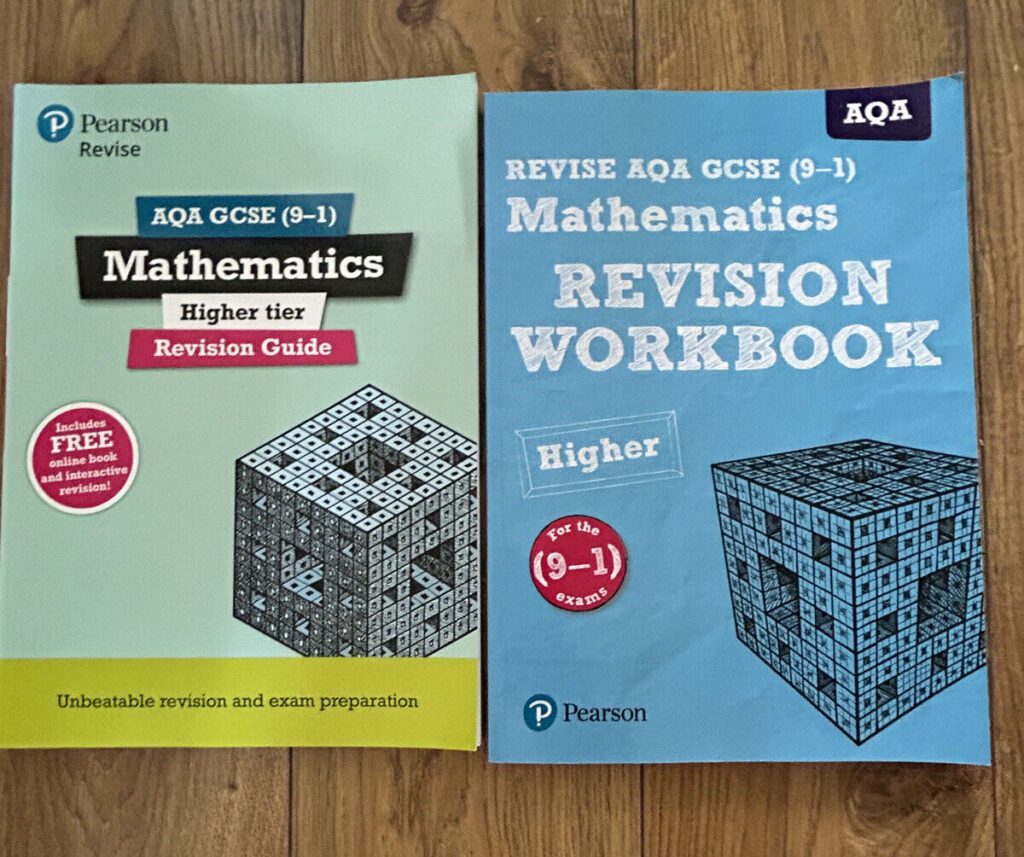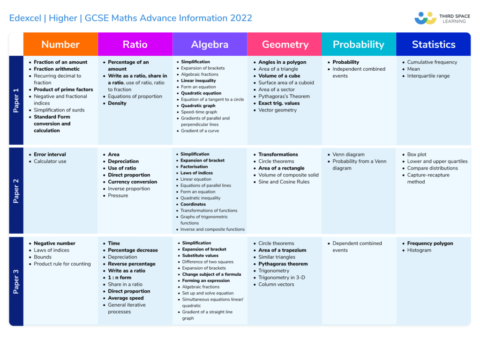Revision Checklists
AQA Higher – Revision Checklist
A Bit of Everything Paper
AQA Higher – A Bit of Everything Paper
AQA Higher – A BIT OF EVERYTHING answers Q1 to Q50
AQA Higher – A BIT OF EVERYTHING answers Q51 to Q98
Practice Papers
Higher Set A Paper 1 – Non Calculator
Higher Set A Paper 2 – Calculator
Higher Set A Paper 3 – Calculator
Higher Set B Paper 1 – Non Calculator
Higher Set B Paper 2 – Calculator
Higher Set B Paper 3 – Calculator
Higher Set C Paper 1 – Non Calculator
Higher Set C Paper 2 – Calculator
Higher Set C Paper 3 – Calculator
Higher Set D Paper 1 – Non Calculator
Higher Set D Paper 2 – Calculator
Higher Set D Paper 3 – Calculator
Practice Papers – Solutions
Higher Set A Paper 1 – Non Calculator Model Solutions
Higher Set A Paper 2 – Calculator Model Solutions
Higher Set A Paper 3 – Calculator Model Solutions
Higher Set B Paper 1 – Non Calculator Model Solutions
Higher Set B Paper 2 – Calculator Model Solutions
Higher Set B Paper 3 – Calculator Model Solutions
Higher Set C Paper 1 – Non Calculator Model Solutions
Higher Set C Paper 2 – Calculator Model Solutions
Higher Set C Paper 3 – Calculator Model Solutions
Higher Set D Paper 1 – Non Calculator Model Solutions
Higher Set D Paper 2 – Calculator Model Solutions
Higher Set D Paper 3 – Calculator Model Solutions
YouTube Playlists
AQA GCSE Information Hub
Quick AQA GCSE Subject Info
Select a subject from the dropdown to see some key details.
About AQA and GCSEs
What is AQA? What does AQA GCSE mean?
AQA stands for the Assessment and Qualifications Alliance. It is one of the main examination boards in England, Wales, and Northern Ireland.
AQA develops and awards qualifications, including GCSEs, AS and A-levels, and vocational qualifications.
GCSE stands for General Certificate of Secondary Education. These are academic qualifications generally taken by students aged 14–16 in secondary schools.
So, "AQA GCSE" refers to a GCSE qualification that is set, assessed, and awarded by the AQA exam board. Many different subjects are offered at GCSE level through AQA.
General Exam & Results Information
Do you get a periodic table in AQA GCSE Chemistry?
Yes, for AQA GCSE Chemistry exams (and Combined Science: Chemistry papers), students are provided with a copy of the Periodic Table of Elements. This is usually included as part of the question paper or as a separate insert.
How to check GCSE results online (AQA)?
AQA itself does not directly provide results to students online. GCSE results are typically distributed by your school or college.
- On results day, your school will inform you how to collect your results. This might be in person, or some schools may have their own online portal or email system to share results.
- If you cannot collect them in person, you should arrange with your school beforehand how you will receive them.
- AQA sends the results to schools and colleges, who then pass them on to students.
Always check with your specific school or exam centre for their procedure on results day.
How do I get replacement GCSE certificates from AQA?
If you have lost your original GCSE certificates issued by AQA, you can apply for a Certifying Statement of Results. This is an official document accepted by employers and educational institutions as proof of your qualifications.
- Visit the official AQA website.
- Look for the section on "Replacement certificates" or "Past results."
- You will typically need to fill out an application form and provide proof of identity.
- There is usually a fee for this service.
- Processing times can vary, so apply well in advance if you need it by a specific date.
AQA does not issue duplicate original certificates, only the Certifying Statement of Results.
Subject-Specific Information (General Overview)
What topics are in AQA GCSE Biology Paper 1?
AQA GCSE Biology Paper 1 typically covers the following core topics:
- Topic 1: Cell Biology (Eukaryotic and prokaryotic cells, microscopy, cell division, transport in cells)
- Topic 2: Organisation (Principles of organisation, animal tissues, organs and organ systems e.g. digestive system, plant tissues, organs and systems)
- Topic 3: Infection and Response (Communicable diseases, viral, bacterial, fungal, protist diseases, human defence systems, vaccination, antibiotics and painkillers)
- Topic 4: Bioenergetics (Photosynthesis, respiration)
The paper will assess your knowledge and understanding of these topics, as well as your ability to apply this knowledge, analyse information, and evaluate data. "How Science Works" and practical skills are integrated throughout.
Always refer to the latest AQA specification for the most accurate and detailed information.
Information on "A Christmas Carol" (AQA GCSE English Literature)
For AQA GCSE English Literature, "A Christmas Carol" by Charles Dickens is a popular 19th-century novel option.
- Exam Questions: Typically focus on themes (e.g., poverty, social responsibility, redemption, Christmas spirit), characters (Scrooge, Cratchits, Ghosts), Dickens' use of language, structure, form, and the social/historical context of the novel.
- Format: You'll usually be given an extract from the novel and asked to discuss it, often linking it to the novel as a whole.
- Past Papers: Reviewing past paper questions can give you a good idea of the types of questions asked. However, specific questions from past years (e.g., 2018, 2019) will not be repeated exactly. Focus on understanding the assessment objectives and practicing different question styles.
Do not look for pre-prepared "answers" to past questions. Focus on developing your analytical skills and understanding of the text.
How many papers are there in AQA GCSE Religious Studies?
For AQA GCSE Religious Studies (Specification A and B), students typically sit two examination papers.
- Paper 1: Usually focuses on the beliefs, teachings, and practices of two chosen religions (e.g., Christianity and Islam).
- Paper 2: Usually covers thematic studies, exploring different religious, philosophical, and ethical perspectives on topics like relationships, peace and conflict, crime and punishment, etc.
The exact structure and content can vary slightly based on the specific options chosen by your school. Always refer to the AQA specification for your course.
Tips for Answering Questions & Revision
General tips for answering AQA GCSE questions (all subjects)
- Read the Question Carefully: Understand exactly what is being asked. Identify keywords (e.g., "explain," "compare," "analyse," "evaluate").
- Plan Your Answer: For longer questions, a quick plan can help structure your thoughts.
- Use Subject-Specific Terminology: Demonstrate your understanding by using correct terms.
- Address all parts of the question: Ensure you haven't missed anything.
- Manage Your Time: Allocate time based on the marks available for each question. Don't spend too long on low-mark questions.
- Show Your Working (Maths/Science): Even if the final answer is wrong, you can get marks for correct methods.
- Be Clear and Concise: Write legibly and get straight to the point, especially for shorter answer questions.
- For "How Science Works" questions (Sciences): Focus on understanding experimental design, variables, reliability, validity, and evaluating data.
- For English Language/Literature: Use PEE/PEA/PETER paragraphs (Point, Evidence, Explanation/Analysis, Reader/Technique, Effect, Reader). Support points with textual evidence and analyse language/structure.
- For History: Use evidence to support your arguments. Understand chronology, causation, consequence, significance, and different interpretations.
General revision tips for AQA GCSEs
- Start Early: Don't leave it to the last minute. Consistent revision is key.
- Understand the Specification: Know exactly what topics and skills will be assessed for each subject. The AQA website has detailed specifications.
- Create a Revision Timetable: Plan what you will revise and when. Be realistic.
- Use a Variety of Methods:
- Note-taking/Summarising: Condense information into your own words.
- Mind Maps/Flashcards: For key concepts, definitions, and facts.
- Past Papers: Essential for understanding question styles, timing, and marking schemes. Do them under timed conditions.
- Online Resources: Websites like BBC Bitesize, Seneca Learning, and educational YouTube channels can be very helpful.
- Textbooks and Revision Guides: Use AQA-approved or recommended resources.
- Teach Someone Else: Explaining a topic to someone else is a great way to solidify your understanding.
- Practice Regularly: Especially for skills-based subjects like Maths and English.
- Look After Yourself: Get enough sleep, eat well, and take regular breaks.
- Ask for Help: If you're struggling with a topic, ask your teachers or classmates.
Tips for "How to get a Grade 9" / "How to get an A*" (now Grade 9)
Achieving the top grades (like a Grade 9) requires a deep understanding of the subject matter and excellent exam technique.
- Master the Entire Specification: You need a thorough knowledge of all topics, including the more challenging ones.
- Develop Higher-Order Thinking Skills: This means being able to analyse, evaluate, synthesise information, and form well-justified judgements, not just recall facts.
- Precision and Accuracy: Pay close attention to detail in your answers and calculations.
- Sophisticated Language and Terminology: Use subject-specific vocabulary accurately and effectively.
- Excellent Application of Knowledge: Be able to apply what you know to unfamiliar contexts and complex problems.
- Consistent High-Quality Work: Perform well across all parts of the exam, not just in areas you're strong in.
- Go Beyond the Obvious: Offer insightful interpretations and make connections between different concepts.
- Perfect Exam Technique: Meticulous planning, time management, and understanding of what examiners are looking for (use mark schemes from past papers to see this).
It requires consistent hard work, dedication, and a genuine interest in the subject.
AQA vs. Other Exam Boards (e.g., Edexcel)
Is AQA harder/easier than Edexcel (or other boards)?
There's a common perception among students that one exam board might be "harder" or "easier" than another for specific subjects. However, all UK exam boards (including AQA, Edexcel, OCR, etc.) are regulated by Ofqual (The Office of Qualifications and Examinations Regulation).
Ofqual's role is to ensure that standards are comparable across different exam boards for the same qualification. This means that, in theory, a GCSE in a particular subject should be of a similar level of difficulty regardless of which board sets the exam.
Differences can exist in:
- Style of Questions: Some boards might phrase questions differently or have a particular focus in their assessment style.
- Structure of Papers: The number of papers, length of exams, and types of tasks can vary.
- Content Emphasis: While core content is similar, there might be slight variations in optional topics or the depth to which certain areas are covered.
Students often find they prefer the style of one board over another based on their learning preferences. It's not accurate to make a blanket statement that one board is definitively "harder" overall. The "best" board is often the one your school chooses and whose style suits you.
Disclaimer: This page provides general information and tips for AQA GCSEs. Always refer to the official AQA specifications for the most up-to-date and detailed information regarding your specific courses. We cannot provide answers to specific past paper questions or copyrighted worksheet materials.



